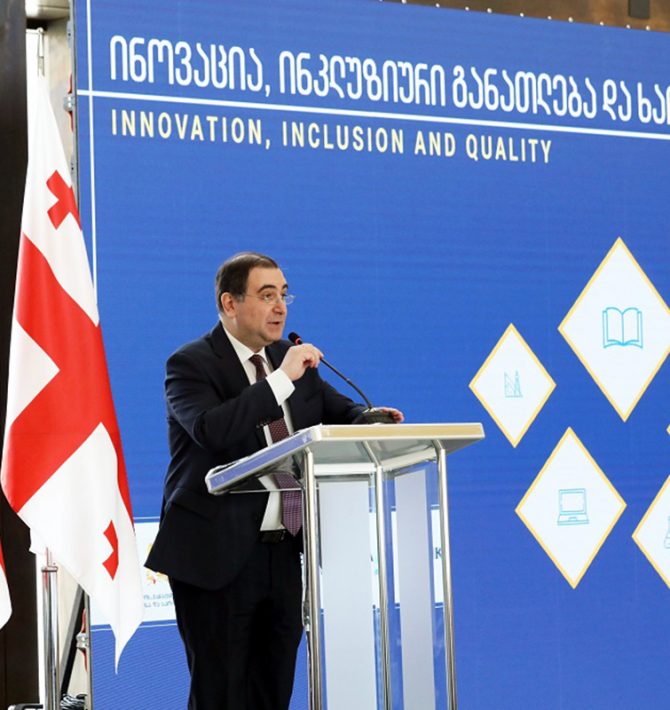Mikheil Chkhenkeli: Productive Cooperation between GoG and the World Bank to Deliver Sustainable Results for Education System
Mikheil Chkhenkeli, Minister of Education, Science, Culture and Sport and Sebastian Molineuss, the World Bank South Caucasus Regional Director announced the launch of new project – Innovation, Inclusion and Quality. The I2Q Project worth 102.7 million dollars aims to boost the quality of human capital by strengthening and promoting 21st century skills and mindsets required to increase productivity, innovation, and competitiveness. Minister addressed the public and talked about the outcomes I2Q Project will deliver to Georgian education system.
Mikheil Chkhenkeli: Ministry has achieved significant progress in reforming education and science system. Broad and comprehensive reform aims total upgrading education outcomes and ensuring the development of human capital that is the major precondition for economic growth. And international support is the most important in this process. I want to express my appreciation toward international donor organizations for their countless support in it.
I want to pay particular attention to the fact that the World Bank Group is Georgia’s leading partner since 1992. World Bank Group partnership framework considers support Georgia in the following: Increase inclusion and competitiveness; Invest in human capital and Increase sustainability of the country. These are the core needs of the country”.
Sebastian Molineus, the World Bank South Caucasus Regional Director: “We actively support the endeavor of the Georgian Government to support youth. We believe that innovative, inclusive and high-quality education is important for boosting human capital in the country. It will minimize the difference that exists in learning outcomes and labor market expectations in the point of view qualified employees”.
I2Q Project has five main aims: Improving Quality of and Access to Early Childhood Education (ECE); Fostering Quality Teaching and Learning in General Education: Strengthening Financing Options and Promoting Internationalization in Higher Education; System Strengthening and Stakeholder Communication; Supporting Project Management, Monitoring and Evaluation.
For the next six years projects infrastructural component includes building five new schools, rehabilitating about 60 schools and implementing of revised and improved school readiness programs in preschool. The direct beneficiaries include a total of about 116,000 students in project-supported schools.
The project also ensures the support for gender equity for vulnerable populations, including students and schools from low socio-economic status located in rural and mountainous areas, ethnic minorities, and students with diverse learning needs. Up to 45 CIF grants that foster modernization of higher education programs and strengthen labor market linkages will support HEIs students.
Project is well aligned with the World Bank’s 2019-2022 Country Partnership Framework and supports GoG’s initiative to implement education reform. The project was approved by the board of the World Bank Executive Directors on May 29, 2019 and the loan agreement was signed on June 18, 2019.







